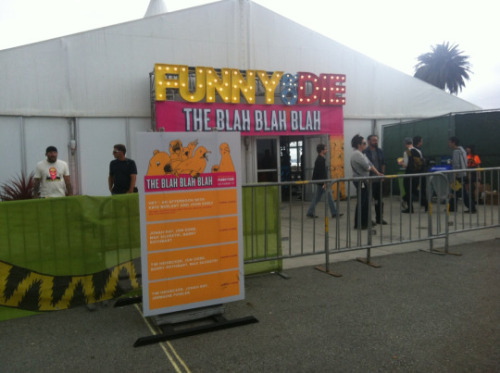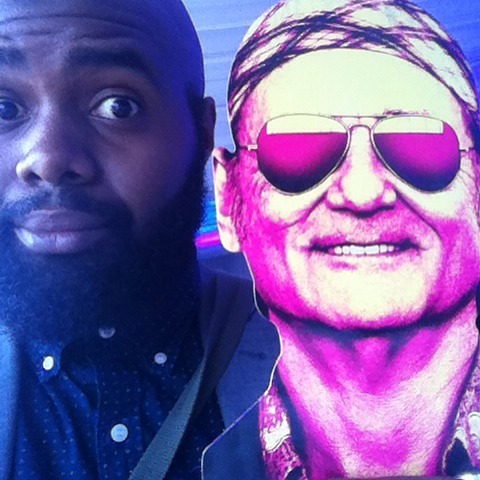
Comedy proved it could coexist with thumping bass, though, the marriage was not without its quirks. From Hey™ with Kate Berlant and John Early to a borderline hostage situation with Tim Heidecker, there was blaring sun, daring hecklers and a shit ton of Bill Murray’s face.

Co-produced by Funny or Die, the comics provided a lot of the former and suffered a little of the latter. This no one’s fault, it was just awkward; comedy in any form is extremely difficult, requiring passive-yet-attentive listening, optimal conditions (preferably low ceiling, wide room) and a lot of booze (or chicken fingers or whatever the audience needs to loosen up) — and, of course, maybe a mic, and a stage, and performers, yadda, yadda. While having adequate facsimiles of the aforementioned, The Blah, Blah, Blah presented unique challenges.
Long, theater-style rows of folding chairs, couches in the front of the stage for the 1%-ers, a designated bar towards the back of the room, two big ass televisions pregaming FunnyOrDie videos—Bat Fight!—ethereal mood lighting and a picturesque panoramic view of San Francisco. The tent was as far away from the music as possible, sheltered from the elements, and monitored by a crack staff. It was a good as it gets (or could get).
Then the shows started. Waves of spectators made entrance and exodus according to whatever musician had ceased or beckoned. The sun, unburdened by the classic SF fog, blasted through, roasting one side of the heated room. A general sense of misunderstanding from many people about how comedy works and the inherent traditions/rules of contributing to the show (i.e. shut up but give it up (when prompted), reconciling that while beautiful and unique in your values, these are all jokes, not a grandstand for outrage). And, because it was unofficially “EDM-day”, the subwoofers permeated into the space as pronounced as a couple vocally hate-fucking in your apartment building. Audience and performers unified with our figurative heads poking out into our figurative hallway, giving each other that knowing raised eyebrows like, “Right?” Tim Heidecker acknowledged it best: “Can we get some music in here that doesn’t make me shit my pants?
Hey™: “She told me don’t worry about it!”
Kate Berlant and John Early, totems for why I regret not joining the drama department in high school, opened with frivolous, no-bullshit choreography to “Can’t Feel My Face”, my new favorite song. (Thanks, guys!) Vogue posing, mock-punching, leaping-high-fiving broke down because John was off his mark. But, like, he was the choreographer, so… Kate responds. John retorts. We’re quickly afforded the crux of the show, a shtick as old as time, and a comedy fan’s dream: two very funny people, who know each other intimately , riffing playfully as they antagonize the shit out of each other (intersected with video, stand-up, and terse reengagement of their The Weeknd routine). In the casual daytime soiree, Kate always had a thinly passive aggressive chide. John, wounded, returned a read. Together they had a meltdown of persistent bickering, and, ultimately, were masters of trying to corpse each other. It became extra hilarious when the sniping would hit either with a legitimate strike—”you’ll never find someone”, “well, your relationship is flawed”—proving meanness is the most intimate means of communication.
In the midst of the tandem, the individuals shined. John Early, the self-proclaimed “Robyn of Comedy”, wearing Youth Pastors Fashion’s Fall Collection, pronounced strong—and unexpectedly poignant—takes on the Supreme Court’s decision on gay marriage being a seeming conspiracy of manipulation equivalent to line-dance instructions, the idiosyncrasies of rolling solo—”I recently jerked off on a wall because someone on Grindr told me to. [beat] Being single is hard.”—and gave a mean Toni Collette in the Sixth Sense sense. I took away that while I was always keen on the man, I’d be down to get behind him as a movement.
I can’t express how bewildered Kate Berlant makes me. Let me rephrase that:Kate Berlant’s genius and physicality is so magnificent that I question reality. How can someone, with wonky facial expressions and ballerina-gone-rogue physicality, say something so poetic and true then double back to make something shallow and tongue-in-cheek sound new-agey and spiritual? How can someone be omnidirectionally aware, but, seemingly, honor themselves completely? There was such a striking, projected authority that it’s difficult to know what Berlant truly believed, and, thus, stripped away my pretense to embrace a wholly unique experience.
Dore, Silvestri, Ray, Rothbart
A standup showcase of doughy, white dudes with varying facial hair featuring Jon Dore (Beard), Max Silvestri (Clean-Shaven), Jonah Ray (Beard), Barry Rothbart (Moustache), battled the mid-afternoon rush as the audience took a turn. A heckler (i.e. asshat) told Dore to stop telling jokes—which he jokingly relented by retreating backstage—while another jerk tried to take the stage, either to console Jon or do some time? The bass from the Tunnel Stage picked up. Someone in the front-seating VIP lounge was utterly insufferable (in their interrupting behavior and their economic standing). Ugh, privilege! Eat the rich!
Dore, host, was a perfect match for the challenges. I’ve stated before that he’s unassumingly one of the funniest people in the world, and it was true on yesterday. He expertly defused the distractions, refused to pander or let up on his sly style of stand-up. A master of manipulating expectation and misinformation, and expert of saying the wrong thing right, he even tried to sing his jokes to the invasive beat, which was commendable.
Max Silvestri and Jonah Ray illuminated the languish of living past your 20s. Max admitted to fashioning a routine to shut out the screams of children at the neighboring elementary school as it coincided with jerking off during freelance work, an anecdote rife with trademark tangents and neurotic-tinged comedy of errors. Charmingly self-effacing Jonah utilized the manifestos of human monsters (Richard Donner, Jim Jones) to evoke the failings of prevalent indie-fication and unfurled a tale of a bloodied wife and eating chicken wings with his shirt off. Both’s energy seemed more suited for the TIMF’s tweed Sunday line-up.
While the other comedians cried foul to the noisemakers outside, the equivalent of bringing a knife to a bazooka fight, Barry Rothbart unleashed his own artillery, by way of a DJ! As Barry marauded between stage left and right, the DJ (Mateo? I think) cut between classic hip-hop breaks and some music themed to the jokes. It was tremendous. Rothbart kinda has a early-90s Golden Age vibe to his steeze sans turntablism, as evident on 2014’s Streets of Fire, commanding a bombastic bravado usually reserved for rappers. But, with the musical interplay, itself dynamic in crossfaded flourishes, picking up the typical dead air of doing standup (i.e. pausing for those applause breaks), the comedy punchlines sounded like rap punchlines, cleverness as means for dominance. Which kind of defines both, so the metaphor’s redundant, right? Either way, this was definitely a highlight of the daylight comedy show.
Double Heidecker
Didn’t intend a double exposure. I lined up early to catch the last programing block and somehow found myself in the back of a packed, standing room only crowd at the tail end of a slicked up comedian in a button-up tucked into boot cut jeans, draped in a black leather jacket, committing to bottom-feeding puns, pop culture references, and word associations rendered through a false confidence. This is my jam. Bad jokes, dumb jokes, bombing. I don’t enjoy it in an ironic, so-bad-it’s-good way. I find unapologetic joy in the presumably false representation of Tim Heidecker and his objectively horrible stand-up.
My appreciation crystallized exponentially during the second take. It was night and day. The first set was brisk, hokey, and hacky all the way to the end. The second didn’t feel like it ended at all. It just dragged and dragged. Previously heard jokes gurgled under a quagmire of misremembered disjointedness, some abandoned mid-setup. It was a full monomyth. As highs as the highs got in the earlier show, the lows got lower in the latter. Tim Heidecker’s persona, an homage to the 1980s comedy boom’s many archaic tropes (catchphrases and ra-ra rhetorical inquiries), was prone to swearing, outbursts and meltdowns. “NO. MORE. BULLSHIT!” Heidecker led the audience to cheer. Infuriating, yet artful flubs. Condescension like, “that music sounds like a dead mouse,” directed at an audience where some had probably paid money to see Deadmau5. The crowd’s collective tightness, our preciousness was rendered inert by the nastiness. Even if the jokes missed, they hit. It was a true testament to Heidecker’s brilliant design and commitment to the bit, to not panic, to fight through the awkwardness usually alleviated with placating servitude. Or he could really be a sociopath. I have no clue.
If somebody left the Blah, Blah, Blah in seeming distaste, or worse, apathy, as many had done all day, the absence only heightened the intended effect. You’re supposed to want to leave the toxic, sputtering insults to your very character for wanting to see a comedy show. It made it that more glorious to stay.
We dwindled. The Obama-hating, thumping-music-hating, self-hating iconoclasm meticulously emptied out the audience with hate-humor. Eventually Dakin, friend of the blog, editor of Spinning Platters and owner of a Discover card, was brought on stage for a mortifying interview, asked about his relationship and mocked for his love of music, before, eventually, receiving a prize: a cheese platter. Later, I asked Dakin how it felt up there. “It was awkward,” he responded.
Heidecker left to a standing ovation and a number of handshakes, though, I didn’t confirm. He could still be there, a brilliant shell of a mad king, as his preferred entrance-exit music, “You Can Call Me Al” by Paul Simon, plays on repeat.
